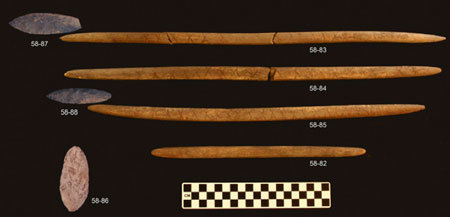
November 13, 2014
9,500 BCE Infant Burials Found at Upward Sun River in Alaska
Archaeologists from the University of Alaska at Fairbanks have uncovered the remains of an infant who died at 12 weeks and a fetus that died shortly before birth. The dates of these infants are at 9,500 BCE. The site would have been the area of Beringia during the last ice age. The site where they were found, at Upward Sun River, shows signs of long term occupation, including the oldest residential structures found in Alaska. Stone projectile points that made up a hafted biface spear, and antler rods were placed in the burials, and all were covered with red ochre. The infants may have been twins. Burials of children within residential structures have been found at the site of Ushki in Siberia, and the biface stone points are similar to those found at the Anzick site in Montana.
Science Magazine has the story here;
http://news.sciencemag.org/archaeology/2014/11/infant-burials-could-help-solve-mystery-who-settled-new-world
Western Digs adds that the antler shafts found in the burial are much longer then others found in North America, and are similar to those found in Siberia. Three of the shafts were covered in multiple X patterns, a new discovery in North American hunting tools.
The research is posted in the Proceedings of the National Academy of Sciences.
Western Digs has the report here with photos of the tools;
http://westerndigs.org/twin-ice-age-infants-discovered-in-11500-year-old-alaska-grave/
